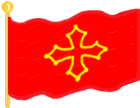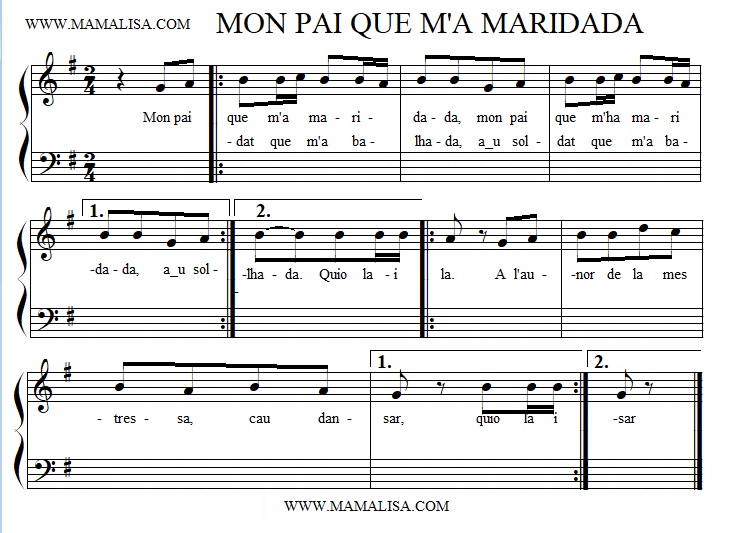Mon pai que m'a maridada
This female-warrior type song is from the Ossau Valley in the Pyrenees and is in the Gascon dialect.
Mon pai que m'a maridada
My Father Married Me Off
Folk Song
Folk Song
(Occitan)
(English)
Mon pai que m'a maridada
Mon pai que m'a maridada
A u soldat que m'a balhada
A u soldat que m'a balhada
Repic
Quiò la i la
A l'aunor de la mestressa cau dansar
Quiò la i la,
A l'aunor de la mestressa cau dansar.
A u soldat que m'a balhada
A u soldat que m'a balhada
Que m'en hè portar las armas
Que m'en hè portar las armas
(Repic)
Que m'en hè portar las armas
Que m'en hè portar las armas
L'arcabusa e mei l'espada
L'arcabusa e mei l'espada
(Repic)
L'arcabusa e mei l'espada
L'arcabusa e mei l'espada
I au costat la corta daga
I au costat la corta daga
(Repic)
I au costat la corta daga
I au costat la corta daga
I a la prumèra batalha
I a la prumèra batalha
(Repic)
I a la prumèra batalha
I a la prumèra batalha
N'a hèit cader vint e quate
N'a hèit cader vint e quate
(Repic)
N'a hèit cader vint e quate
N'a hèit cader vint e quate
Sire le Roé la s'a 'spiada
Sire le Roé la s'a 'spiada
(Repic)
Sire le Roé la s'a 'spiada
Sire le Roé la s'a 'spiada
Qu'a demandat a sos pages,
Qu'a demandat a sos pages :
(Repic)
Qu'a demandat a sos pages,
Qu'a demandat a sos pages :
"-Qui ei 'cest soldat qui 'tau frapa
Qui ei 'cest soldat qui 'tau frapa
(Repic)
Qui ei 'cest soldat qui 'tau frapa
Qui ei 'cest soldat qui 'tau frapa
-No ei soldat, qu'ei bèra dama
No ei soldat, qu'ei bèra dama
(Repic)
-No ei soldat, qu'ei bèra dama
No ei soldat, qu'ei bèra dama
-Hèt-la-me tornar 'n batalha
Hèt-la-me tornar 'n batalha
(Repic)
Hèt-la-me tornar 'n batalha
Hèt-la-me tornar 'n batalha
Jo lo doblarei los gages
Jo lo doblarei los gages."
(Repic)
My father married me off
My father married me off,
He gave me to a soldier
He gave me to a soldier.
(Chorus)
Keyo la ee la
In honor of the mistress, we must dance,
Keyo la ee la,
In honor of the mistress, we must dance.
He gave me to a soldier
He gave me to a soldier
Who makes me bear arms
Who makes me bear arms.
(Chorus)
Who makes me bear arms
Who makes me bear arms,
The arquebus* and the sword too
The arquebus and the sword too.
(Chorus)
The arquebus and the sword too
The arquebus and the sword too,
And on the side, the short dagger
And on the side, the short dagger.
(Chorus)
And on the side, the short dagger
And on the side, the short dagger,
And at the first battle
And at the first battle.
(Chorus)
And at the first battle
And at the first battle,
She made twenty-four of them fall
She made twenty-four of them fall.
(Chorus)
She made twenty-four of them fall
She made twenty-four of them fall,
Sire the King watched her
Sire the King watched her.
(Chorus)
Sire the King watched her
Sire the King watched her,
He asked his pages
He asked his pages...
(Chorus)
He asked his pages
He asked his pages,
"Who is this soldier that strikes this way?"
"Who is this soldier that strikes this way?"
(Chorus)
Who is this soldier that strikes this way?
Who is this soldier that strikes this way?
"It's not a soldier, it's a fine lady."
"It's not a soldier, it's a fine lady."
(Chorus)
"It's not a soldier, it's a fine lady."
It's not a soldier, it's a fine lady."
"Have her go back into battle."
"Have her go back into battle."
(Chorus)
"Have her go back into battle."
"Have her go back into battle,
I'll double her wages."
"I'll double her wages."
(Chorus)
Notes
*An arquebus is a form of long gun that appeared in Europe and the Ottoman Empire during the 15th century.

Thanks and Acknowledgements
Translated by Monique Palomares.


























